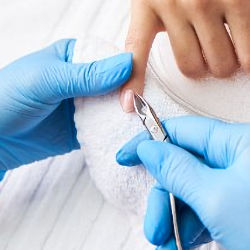Protection Against Biological Hazards
Follow these safe work practices to eliminate or reduce exposure to bloodborne pathogens and other biological hazards.

- Avoid touching any blood or bodily fluids.
- Wear gloves, and avoid clients with cuts, open wounds/sores, blisters, or visibly infected skin on their hands, feet, or nails.
- Throw away disposable gloves immediately after using them.
- Always wash your hands with soap and water before and after working with clients to avoid spreading germs.
- Bandage open cuts or broken skin to prevent contact with blood or other potentially infectious materials from a client or coworker.
- If an individual is bleeding, do not touch the blood. Ask the individual to use a cotton ball or tissue to stop the bleeding and to throw the used material directly into the trash once the bleeding has stopped.
Immunization against hepatitis B. Your employer must offer you hepatitis B immunization without charge if you are likely to be exposed to human blood or other infectious materials (OPIM) during your work. Your doctor can help you determine whether this is needed. Immunization practices can vary by state, so be sure to follow your state's requirements.
Knowledge Check Choose the best answer for the question.
2-3. Your employer must offer you hepatitis B immunization _____.
You forgot to answer the question!
